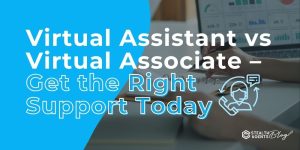Web scraping vs data mining is all about collecting data vs uncovering insights and Stealth Agents helps you master both with ease. Their expert virtual assistants streamline your data collection and turn it into usable insights, so you can make smarter business decisions faster. Book a free consultation at stealthagents.com today!
Both techniques have immense power, but understanding web scraping vs data mining is essential for saving time and making more informed decisions.
Data is the backbone of every successful business, but extracting it can often feel overwhelming.
Many professionals compare web scraping vs data mining to understand which method suits their needs.
Businesses struggling with complex data tasks can turn to Stealth Agents for outsourcing services or skilled virtual assistants.
With expert virtual assistant data entry support, you can uncover hidden insights and actionable trends without the hassle of managing the process yourself.
Don’t let data challenges slow you down when more brilliant assistance is just a call away.
Book a free consultation now to know more about our virtual assistant pricing.
What Is The Difference Between Web Scraping And Data Mining?
Web scraping and data mining are methods of extracting and analyzing data, but they differ in purpose and approach.
Web scraping uses automated tools to collect specific data from websites, such as product prices or contact information.
On the other hand, data mining deals with identifying patterns and trends in large datasets, often relying on complex algorithms.
When comparing web scraping vs. data mining, it’s important to note that it gathers raw data, while data mining makes sense of pre-existing data.
Businesses often consider understanding virtual data mining services for web scraping to ensure accurate data collection tailored to their needs.
For data mining, companies might hire virtual data backup assistants for executives and experts capable of using sophisticated software to interpret and analyze data effectively.
Understanding these methods’ distinctions helps you select the right approach for your project requirements.
How Can Web Scraping Help Businesses Gather Relevant Data Quickly?
Web scraping is a valuable tool for businesses to gather relevant data from websites quickly and efficiently.
It allows companies to collect specific information, such as market trends, competitor prices, and customer reviews, without manual effort.
When comparing web scraping vs data mining, web scraping focuses on retrieving raw data, while data mining helps analyze and interpret existing data.
Businesses often consider hiring experts for web scraping to ensure accurate and comprehensive data extraction.
This method saves time and resources by automating the collection of large volumes of information.
Hiring a business virtual assistant for such tasks can help businesses stay competitive by accessing current and valuable market data.
Web scraping is crucial in providing timely information to support data-driven decisions.
Why Should Businesses Compare Web Scraping vs Data Mining For Their Needs?
Businesses should carefully assess web scraping vs data mining to determine which method best fits their needs.
Web scraping involves extracting raw data from websites, such as contact details, product listings, and customer interactions.
Data mining, on the other hand, focuses on analyzing pre-existing datasets to uncover trends, patterns, and insights.
Hiring an independent virtual assistant skilled in web scraping can ensure businesses collect accurate and helpful information tailored to their goals.
For data mining, companies may hire an all-in-one virtual assistant to interpret large volumes of processed data effectively and derive meaningful results.
Businesses can make informed decisions to achieve their objectives by understanding the distinctions between these two approaches.
Evaluating both methods is essential for aligning data collection and analysis strategies with overall business goals.
What Types Of Data Can Be Collected Using Web Scraping?
1. Product and Pricing Data
Web scraping is often used to collect detailed pricing and product information from e-commerce websites.
This data can help businesses analyze competitors, adjust their pricing strategies, and offer competitive rates to customers.
You can extract details like product names, descriptions, prices, reviews, and even stock availability.
Unlike web scraping, which has a broad focus compared to data mining, scraping for product data is targeted and typically focuses on specific fields on a webpage.
Companies looking to hire data experts often choose web scraping because it is precise in gathering up-to-date, real-time insights.
Such data is essential for dynamic pricing models or comparison websites where users benefit from updated information.
By collecting this data regularly, businesses can strategically position themselves ahead of competitors while better attending to customer demands.
2. Social Media and User-Generated Content
Social media platforms and forums host a wealth of user-generated content, which can be scraped for sentiment analysis and trend monitoring.
Marketers use this data to learn what users say about their brand, competitors, or specific topics.
Through web scraping techniques, businesses can extract social media posts, comments, hashtags, user profiles, and engagement metrics.
Unlike broad approaches like web scraping vs data mining, social media scraping is refined and specific to real-time audience sentiments.
Hiring skilled professionals for this task can ensure platforms’ guidelines and terms of service are respected while acquiring valuable insights.
This type of data collection helps brands craft campaigns that are better aligned with their audience’s voice and interests.
Social listening, powered through scraped content, allows for a more tailored approach to audience engagement and competitive analysis.
3. Market Research and Trends
Web scraping enables businesses to gather volumes of information to conduct effective market research.
This data can include industry trends, client feedback, competitor launches, and emerging market behavior patterns.
By comparing web scraping vs data mining, one can see how scraping offers current details while data mining focuses on historical patterns.
Hiring experts to scrape websites ensures this research is accurate and up-to-date, which helps build actionable business strategies.
The ability to extract trend-based data helps organizations stay relevant and adapt their offerings to meet market demands.
Web scraping empowers brands to turn raw data into valuable solutions, such as identifying customers’ pain points and wants.
Continual research supported through scraping ensures businesses stay one step ahead in competitive industries.
4. News and Online Content
Web scraping can efficiently gather news articles, blog posts, and other forms of online content for continuous monitoring, a process often highlighted in virtual assistant blogs.
This helps businesses remain informed about public sentiment, media coverage, and emerging issues affecting their niche or industry.
Media companies and analysts often compare web scraping vs data mining to determine the best way to collect live updates and track events.
Hiring professionals to implement web scraping ensures relevant and clean data is gathered without wasting time on irrelevant sources.
With consistent access to current information, companies can quickly pivot or adapt to crises and opportunities before their competitors.
Web scraping reduces manual efforts, providing an automated way to stay informed about real-time key discussions.
This tool is crucial for industries like journalism, public relations, and corporate communications to stay competitive.
5. Job Postings and Recruitment Data
Recruitment companies and hiring managers often rely on web scraping to collect job postings and candidate profiles.
Extracted data can include job titles, descriptions, required skills, salaries, and company details to shape hiring strategies.
Understanding web scraping vs data mining is helpful here, as scraping gathers real-time data, which is valuable in such fast-paced industries.
Scraping can help recruiters monitor job market trends and discover emerging skills and qualifications employers seek.
Hiring tech professionals for web scraping can ensure the process is accurate, reducing redundancy in recruitment workflows.
This information helps recruitment agencies refine their processes, improve their job analytics, and even improve the experience for job seekers.
With this timely data, recruiters and companies can make faster decisions and secure the best talent before others.
How Do Businesses Benefit From Choosing Web Scraping Or Data Mining Tasks?
1. Gaining Competitive Pricing Insights
Businesses often use web scraping or data mining to monitor competitor pricing and market trends.
These methods help collect helpful information on product costs, promotional offers, and dynamic pricing strategies.
By analyzing the data collected, companies can make informed decisions about their pricing to remain competitive.
When comparing web scraping vs data mining, scraping focuses on current, real-time data, while mining examines historical patterns for long-term insights.
Hiring experienced data experts ensures efficient collection and organization of this information to enhance its usability.
For retailers and service providers, staying informed about competitors’ pricing strategies is essential to attract customers and boost potential sales.
These approaches enable businesses to adapt their pricing structures and stand out in competitive markets.
2. Monitoring Brand Reputation Online
Web scraping, or data mining is valuable for monitoring brand mentions, reviews, and public sentiment across various platforms.
Businesses can collect and analyze data from forums, blogs, social media, and review sites.
This lets them stay updated on how their target audience perceives their brand.
Web scraping is perfect for gathering real-time mentions compared to data mining, while mining helps identify patterns over time.
Hiring skilled personnel to manage these tasks ensures compliance with data collection regulations and delivers targeted results.
Insights gained from this practice can guide companies in revising their customer services, products, or public strategies.
Keeping a pulse on public sentiment addresses issues quickly and strengthens the brand’s trust and image.
3. Refining Marketing Campaigns
Businesses use web scraping and data mining techniques to improve the precision of their marketing campaigns.
These methods enable companies to identify what products or services resonate most with their customers.
By examining purchasing behaviors, trends, and user interactions, firms can design campaigns that better align with consumer needs.
Web scraping vs data mining plays a key role here; scraping captures ongoing trends, whereas mining highlights consistent preferences or patterns.
Hiring experts to process this data ensures marketing decisions are accurate and impactful.
Businesses can improve engagement and boost campaign performance with detailed and timely insights.
Marketers also benefit by staying ahead of competitors and continuously refining their strategies based on consumer ideas.
4. Streamlining Recruitment and Job Market Insights
Web scraping and data mining are practical tools for collecting job-related data from online platforms and recruitment portals.
They allow businesses to gather precise details about job availability, salary trends, in-demand skills, and other recruitment-related statistics.
Web scraping vs data mining offers distinct advantages; scraping focuses on real-time updates, while mining looks at overarching trends.
Hiring experts for these data collection tasks ensures reliable results that can better guide recruitment strategies.
This data can reduce the manual effort needed to track openings and highlight emerging areas requiring skills.
For hiring managers, these methods provide valuable insights into aligning job offers with market expectations.
Such approaches streamline the recruitment process, improving alignment between the needs of companies and job seekers.
5. Analyzing Customer Data for Better Service
Businesses often rely on web scraping and data mining to collect and understand customer behavior data for personalized service.
Information such as purchase history, preferences, and browsing patterns can all be scraped or mined.
Web scraping vs data mining plays an important role here, as scraping fetches real-time actions, while mining focuses on behavioral trends.
Hiring qualified professionals ensures customer data collection from various platforms is ethical and methodical.
These insights assist in offering better service, understanding consumer satisfaction, and tailoring products to meet demand.
Businesses can cultivate long-term loyalty and satisfaction by creating a more nuanced understanding of their customer base.
Using accurate data ensures a stronger connection between businesses and their customers.
6. Identifying Emerging Industry Trends
Web scraping and data mining help businesses stay ahead by identifying new industry trends and patterns.
This includes tracking innovative ideas, technological advances, consumer preferences, and competitor activity.
A comparison between web scraping vs data mining shows that scraping is valuable for real-time developments, while mining reveals hidden trends within historical data.
Hiring skilled professionals enables companies to analyze this information efficiently and use it to remain competitive.
Staying aware of changes ensures businesses embody strong market relevance and adapt quickly to technological developments.
By acting on emerging data, firms can innovate product offerings tailored to customer demands or new market gaps.
Such responsiveness allows businesses to maintain their competitive edge in constantly evolving industries.
7. Enhancing Decision-Making Processes
Web scraping and data mining enrich business decision-making with accurate and actionable insights.
These techniques provide valuable support for strategic decisions, from discovering market opportunities to understanding consumer behavior.
For instance, web scraping vs data mining lets companies choose between immediate data collection or deep pattern analysis based on their goals.
By hiring specialists to handle this process, businesses ensure data quality, precision, and expertise are at the core of decisions.
With concrete data, companies can effectively evaluate risks and opportunities, supporting financial and operational success.
These methods bring consistency and clarity into business decision-making, reducing reliance on guesswork.
Over time, data-guided decisions can significantly contribute to long-term growth and overall efficiency.
8. Improving Content Strategies
Web scraping and data mining also play a critical role in refining business content strategies.
They collect relevant online information from consumer reviews, competitor websites, and trending industry discussions.
Companies can analyze which content types resonate most with their audience, enhancing engagement and relevance.
Web scraping vs data mining emphasizes their utility, with scraping capturing ongoing topics and mining spotting broader preferences or gaps.
Hiring experts for these tasks ensures high-quality data, enabling brands to create contextually relevant material consistently.
Such detailed insights help improve SEO efforts, blog post ideas, and marketing copy tailored to audience expectations.
Remaining in tune with audience preferences gives businesses an edge regarding online visibility and credibility.
Takeaways
Choosing between web scraping and data mining is critical for businesses aiming to gather accurate data efficiently.
Both methods serve unique purposes, with web scraping excelling in collecting raw website data and data mining uncovering actionable insights from existing datasets.
For businesses looking to streamline their operations, hiring skilled professionals or a virtual assistant can make all the difference in achieving data-driven results.
Stealth Agents offers reliable services tailored to your data collection and analysis needs.
They provide expert guidance, ensuring you select the correct methodology for your goals.
Call Stealth Agents today to book a free discussion and explore their pricing options and customized solutions.
Make the right choice for your business’s success by partnering with trusted experts.
Data can help your business grow. Our virtual assistants can make collecting and using data easy for you. Book a free consultation today!
Frequently Asked Questions
How does web scraping impact data privacy and compliance?
Web scraping can cause privacy issues if personal information is collected without permission. Companies must follow laws like GDPR or CCPA when scraping data. To stay compliant, they should use ethical practices, respect website rules, and handle data responsibly to avoid legal trouble and keep user trust.
What industries benefit most from outsourcing web scraping and data mining?
Industries like e-commerce, finance, real estate, and marketing benefit a lot from outsourcing these tasks. These fields need large amounts of data to study prices, market trends, and customer behavior. Outsourcing helps them handle big datasets and find useful insights more easily and affordably.
How do virtual assistants improve the efficiency of web scraping and data mining tasks?
Virtual assistants make these tasks faster by automating data collection and analysis. They use special tools to gather and process large amounts of data quickly. This saves time, ensures accuracy, and helps businesses focus on making decisions based on the data.
What are the ethical considerations in web scraping and data mining?
Ethical practices include collecting data legally, following website rules, and protecting user privacy. Businesses should avoid scraping sensitive information and be clear about how they use the data. Following privacy laws and being transparent are key to staying ethical.
How can businesses choose the right tools for web scraping and data mining?
Businesses should pick tools based on their data needs, how well the tools fit with their current systems, and how easy they are to use. They should also consider cost and whether the tools follow data protection laws. Trying out tools or asking experts can help in making the right choice.
What are the common challenges faced in web scraping projects?
Challenges include dealing with websites that change their layouts, managing large amounts of data, and keeping the data accurate. Privacy concerns and staying within legal limits are also ongoing issues that businesses need to handle carefully.
How do web scraping and data mining contribute to predictive analytics?
Web scraping and data mining collect the information needed for predictive analytics. By studying past data and current trends, businesses can predict future outcomes and make better decisions. These methods help find patterns that improve planning and risk management.
What are some alternatives to web scraping for data collection?
Alternatives include using APIs, which provide structured and reliable data, or buying data from third-party providers. APIs are often safer and follow legal rules, while third-party providers offer ready-to-use datasets. These options reduce the risks linked to unauthorized scraping.
How can businesses ensure data accuracy when using web scraping and data mining?
To keep data accurate, businesses should use trusted tools, update their scraping methods regularly, and check the data for errors. Cross-checking with reliable sources and reviewing processes often can help maintain the quality of the data.
How does real-time data collection differ between web scraping and data mining?
Real-time data collection with web scraping means gathering up-to-date information from websites as it happens. Data mining, on the other hand, looks at older data to find patterns and trends. Web scraping gives immediate insights, while data mining helps with long-term planning.









